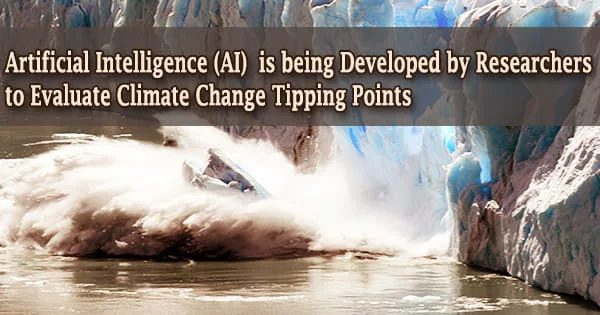Artificial intelligence (AI) is being developed by researchers to evaluate climate change tipping points. The deep learning program might serve as an early warning system for climate change that has gotten out of hand.
Chris Bauch, an applied mathematics professor at the University of Waterloo, is one of the co-authors of a recent research paper that details the new deep-learning algorithm’s findings. According to Bauch, the research examines the points beyond which a system undergoes fast or irreversible change.
“We found that the new algorithm was able to not only predict the tipping points more accurately than existing approaches but also provide information about what type of state lies beyond the tipping point,” Bauch said. “Many of these tipping points are undesirable, and we’d like to prevent them if we can.”
Melting Arctic permafrost, which could release massive amounts of methane and spur further rapid warming; breakdown of oceanic current systems, which could lead to almost immediate changes in weather patterns; or ice sheet disintegration, which could lead to rapid sea-level change are all examples of tipping points often associated with runaway climate change.
According to the researchers, the AI was built to learn not just about one sort of tipping point, but also about the features of tipping points in general.
The approach’s power comes from the combination of artificial intelligence and mathematical theories of tipping points, which achieves more than each method could on its own. The researchers tested the AI on particular real-world tipping points in diverse systems, including historical climate core samples, after training it on a “universe of potential tipping points” that includes approximately 500,000 models.
“Our improved method could raise red flags when we’re close to a dangerous tipping point,” said Timothy Lenton, director of the Global Systems Institute at the University of Exeter and one of the study’s co-authors. “Even if they can’t avert it, providing better early notice of climatic tipping points might help society adapt and minimize their vulnerability to what’s ahead.”
Deep learning is making significant progress in pattern recognition and classification, with researchers converting tipping-point detection into a pattern-recognition issue for the first time. This is done in the hopes of detecting patterns that occur before to a tipping point and using a machine-learning algorithm to predict whether or not a tipping point will occur.
“People are familiar with tipping points in climate systems, but there are tipping points in ecology and epidemiology and even in the stock markets,” said Thomas Bury, a postdoctoral researcher at McGill University and another of the co-authors on the paper. “What we’ve learned is that AI is very good at detecting features of tipping points that are common to a wide variety of complex systems.”
According to Madhur Anand, director of the Guelph Institute for Environmental Research and another of the project’s researchers, the new deep learning system is a “game-changer for the ability to forecast large alterations, particularly those linked with climate change.”
Now that their AI has figured out how tipping points operate, the team is working on the next step: feeding it data on current climate change patterns. However, Anand offered a warning about the dangers of such information.
“It definitely gives us a leg up,” she said. “But of course, it’s up to humanity in terms of what we do with this knowledge. I just hope that these new findings will lead to equitable, positive change.”
















